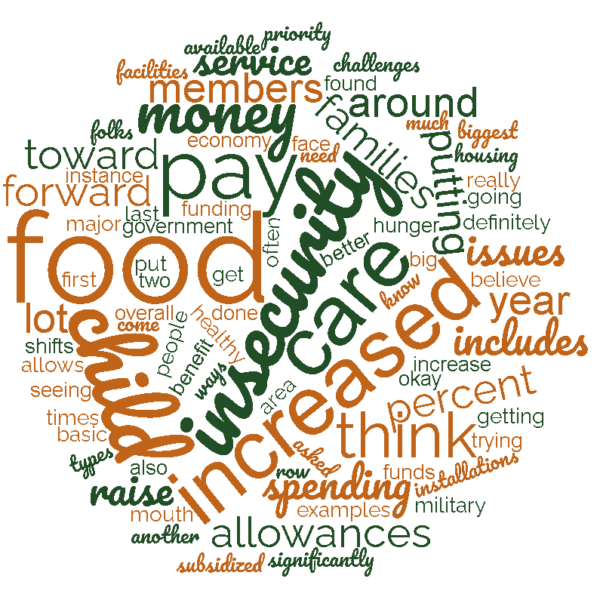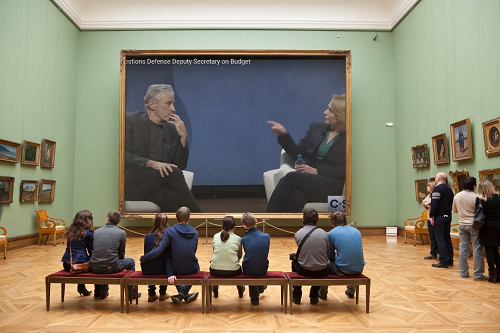Jon Stewart does a master class in sales, identity Borg’ing and using plastic words as props.
This is forensics on how he did it and what we bought
I’ve chapterized this so you can skip around more easily and can even jump to the conclusion and work your way backwards. This post is also not complete in that I wanted to keep it enjoyable for you to read, and for me to write.
There’s a short video to watch and then we’ll do a post-mortem.
Table of Contents
Watch the video
Don’t cheat, don’t skip ahead, it’s only 6 minutes long. I promise it will change your life.*
Don’t watch it with your critical reasoning dial tuned to ‘high’. Instead just watch the thing like you do any other video on social media. I know it’s like telling you not to think of a pink elephant, but really, please don’t think about a pink elephant.
Comedian Jon Stewart and Deputy Defense Secretary Kathleen Hicks
The video went viral on Twitter. I first saw it on the timeline of my friend Mike Cernovich, he wrote:
“This video shows why the media is the way it is. Government officials can’t even respond to BASIC questions from fellow stooges of the regime like Jon Stewart. He poses no threat. He coddles them. But even basic questioning and it’s a meltdown. Imagine if we had a real press”
I’m a reply scrawler and I see this:
“I’m not a Stewart fan and I agree he didn’t press hard, but he did more than 98% of them do. If only any had courage.“
The way they perceive the video is true but it is not correct
This clip is the behavioral sciences in all its glory being deployed like a weapon by the Department of Defense.
What we watched is sales in cinematic form, with emotional aesthetics of words, gestures and props. And, we saw the two participants performing, aligned in a ‘sales’ purpose.
All of this is rhetoric, prompts, cues and the shaping of our sensory and intellectual environment done to persuade and to alter a trajectory.
What was the sale? What did we buy? Let’s discuss…
Characters, setup and ambience
Jon Stewart: Speaks with a new England WASP fisherman on the weekend everyman’ish type of gruff. He has white hair, tossed in a Noam Chomsky fashion. Because we already know who John Stewart is we have an expectation that he is in the role of some pursuer of greater truth. He’s a celebrity Democrat activist, so we know he will only chase a fellow Democrat so far.
He is sitting in a chair, this is a prop. His hand and face make gestures that express (fashionable) skepticism. We can distinguish this from other times we have seen him in altercations against Republicans where he uses a style of bombastic humiliation.
Jon is a surrogate for ‘us’, and through him we are effectively outsourcing our inquiry, doubt and bureaucratic cynicism.
Deputy Secretary of Defense Kathleen Hicks: Her primary responsibility is managing the defense budget and executing the defense secretary’s priorities. She is dressed like Donald Rumsfield and she points her finger a lot.
The video clip opens with him in what seems to be mid encounter with a hostile witness type of guest.
Transcript and annotations
Jon: (asking about corruption, waste, fraud and uncompleted audits) “Do you feel like these are unfair questions of somebody within a department of that size and scope?”
Why did Jon specifically ask that question? Obviously it’s not “unfair,” nor would she ever say such questioning is “unfair.”
We are being instructed on middle class etiquette, the cordiality and proper manners of how questioning should be conducted under a scaffold of being adversarial, anything that is not this – the interlocutor is being “unfair.”
Why do I specify Middle class?
Because the Upper class doesn’t have to rely on a surrogate to question political leaders and appointees nor do they have to stay in the confines of etiquette because they don’t suffer the same amount of economic or social vulnerability should they breach etiquette. Lower class people don’t have the discretionary time or political capital to convene in true dissent against a regime.
It is the Middle class that not only has all the vulnerabilities, but because they are wage earners and their taxes are more easily captured, this is meant to quell, to reduce friction.
Hicks: “I think you have a particular thing you really want to talk about and you’re asking me other questions but I don’t think it’s unfair to ask me about the audit. It’s absolutely the case of the United States military should be able to pass an audit and we’ve got to be on that pathway to get there but I don’t think it’s unfair to ask me about the audit.”
(Eristic: Sophistical regimen where you try to catch people in logical contradictions and inconsistencies, preys on the ambiguity of language)
Now we know that it is not “unfair“, but it is unfruitful. She (and Jon discreetly) disables further questions about audits by saying “we’ve got to be on the pathway to get there,” this diverts his line of questioning from waste, corruption and fraud, to questions about procedures, organizational charts, resources, staffing, time, bureaucracy.
Jon: “The audit that they have in the military doesn’t really look at whether or not there’s efficacy it’s just whether they got delivered the thing that they ordered.”
Efficacy? This is not a finance term. Jon, playing the well intended fool, withdraws any coherent meaning of an “audit” and uses confusion as a tactic by stating some non-existent property of “an audit.” It doesn’t need to make sense, it only needs to be agreed on that it makes sense.
Jon: “Generally those audits aren’t 400 billion dollars for Raytheon and 1.7 trillion dollars for a plane that doesn’t seem to be doing like there is a lot of waste.”
Huh? Raytheon isn’t getting $400 billion and the f-15 that he refers to is not getting $1.7 trillion dollars, although maybe cumulative, but that is not articulated. Remember, Jon is the People’s Surrogate, and now he uses some folksy, intentionally stupid dinner talk bumbling. He does seem rather unprepared, no? And he does have a staff, no?
Hicks: “Audits and waste product reviews are not the same thing so let’s decompose these.”
Now we see and hear that his backwoods’ness was an act to allow a total transformation of the conversation, which commences…
Jon: “Please educate me.”
He goes from a pursuer to a collaborator. He has staff that could have given him exactly the information he needed, such as the specific instances of fraud, failed Inspector General reports, failure to comply with disclosure laws, etc
Jon: “But if you can’t tell me where it went then what am I supposed to think?”
Tell me how to think kinda speaks for itself.
Jon: “I think most people would consider that somewhere in the realm of waste fraud or abuse because they would wonder why that money isn’t well accounted for.”
Breaking down that one modular sentence into components:
- “I think most people would consider”
- “Somewhere in the realm of”
- “because they would wonder”
Clearly he is narrowing the window of acceptable discourse, as he said a few earlier moments before “…what am I supposed to think?”. Now he’s telling you what you are supposed to think
Finally, here’s his big reveal:
Jon: “…especially when they see food insecurity on military bases.”
(Ideologeme: A unit of an ideology)
How the heck did that leap happen? This has become a slice of reality television.
The audience is a collective of solipsists that have their lives put into juxtaposition with others’ – the military personnel who suffer from “food insecurity”. These are people who the audience believe are socially inferior to themselves.
Finally, here’s her big reveal:
Hicks: “Do you want to talk about that because that’s a good idea? We should understand where you’re trying to go other than the dollars, which really bothers you“ (she laughs dismissively)
Jon: “I mean we got out of 20 years of war and the Pentagon got a 50 billion dollar raise like that. That’s shocking to me.“
“to me” is not “to the American people”, he has now reduced the figurative plaintiffs from all of the American people, to just himself, but you will be bound by his decision.
Jon: “…850 billion dollars to a department means that the rank and file still have to be on food stamps. Like to me that’s fucking corruption. I’m sorry and if like, if that blows your mind and if you think like that’s like a crazy agenda for me to have.”
When he says “rank and file” he is now reestablishing that he is the People’s surrogate, now in the domain of “food insecurity.”
His use of “…fucking…” is to emphasize his working stiff popularist sameness to his audience.
He stammers, an intensifier, everyman fluster that he uses to convey this as a Monty Python’esque absurdity.
Her response is designed to resolve this…
Hicks: “Okay on food insecurity, a major priority for us. A lot of funds are going toward that, the biggest issues we have found; First of all we have significantly increased funding on food insecurity and we do think we are getting much better on that.
We believe some of the challenges we face are not what you often think of as, you know, food insecurity as hunger.
They’re really around, do we have food available, for instance, as people come on and off shifts is it healthy food?
Those are the types of food insecurity issues we are seeing in and around our military installations. We have increased pay two times in a row. Here we’ve done a 4.6 percent pay raise last year. We’ve asked for a 5.2 percent pay raise this year.
We’ve also increased basic allowances and increased housing, pay and other allowances so overall we definitely think we need to increase the spending that we are putting forward toward our service members and their families. We’re putting our money where our mouth is. Another big area is child care spending. A lot more money on child care that includes both child care facilities and it includes a benefit that allows folks to go out on the economy to get child care and have that is subsidized by the government. Those are all examples of ways we’re trying to put money forward for our service members and their families.”
She spoke 242 words in her closing statement “food insecurity” “significantly increased funding” “food insecurity” “food insecurity” “is it healthy food” “food insecurity” “increased pay” “4.6% pay raise” “asked for 5.2% pay raise this year” “increased basic allowances” “increased housing and pay and other allowances” “putting forward” “putting our money where our mouth is” “lot more money on child care” “subsidized by the government” “put money forward”

Neither Jon Stewart or Deputy Secretary of Defense Kathleen Hicks grace us with a definition of what food insecurity ‘is’. They are moving too fast in this intellectual firestorm to bother with small talk. These are two Beautiful Minds solving quantum physics problems.
When he first introduces the term “food insecurity” she doesn’t ask him to define it so that they, and the audience, can come to an agreement on what ‘it’ ‘is’, yet she argues forcefully about the meaning of the word “audit.”
Then picking up from his cue, she uses the term “food insecurity” and its vernacular peripherals so much and with such force and bureaucratic contemplation that it gives an authoritative appearance of surgical precision.
How can you be so stupid to not know what it is?
Any questioning would probably go like this:
- “You don’t know what food is?”
- “You don’t know what insecurity is?”
- “You don’t know what hunger is?”
We, as viewers can’t ask them questions about its meaning, all we can do is choose to comply, or not. But, because he keeps the show amusing and provocative we ‘accept’ the term on their ‘conditions’.
It is a surrender. Jon is surrendering for you.
Food insecurity is an odd term. I’m old enough to remember America’s “war on hunger” and perhaps that was won but what remains is little pockets of resistance, food insecurity’ites.
What is Food Insecurity? (source: U.S. DEPARTMENT OF AGRICULTURE)
- Low food security: reports of reduced quality, variety, or desirability of diet. Little or no indication of reduced food intake.
- Very low food security: reports of multiple indications of disrupted eating patterns and reduced food intake
Can an obese person have food insecurity? (source: MedicalNewsToday)
Nearly 23% of people with obesity in the United States have reported food insecurity.
People with low food security report concerns that food will run out before they can afford to buy more and being unable to afford balanced meals.
Internationally, food insecurity more often relates to the frequency of conflict and to climate-related failure of harvests. Very low food security is more likely to lead to reduced food intake and undernourishment.
The personnel on the military bases that Jon Stewart and the Defense Department are so worried about? Well…
:quality(70)/cloudfront-us-east-1.images.arcpublishing.com/archetype/BUJXO6UH3JEHXKE226NOGS7YEA.jpg)
And, fat is healthy

And,

Jon Stewart and the Department of Defense, why now?
March 13, 2023 (roll call) “As the Pentagon unveils its $842 billion budget request for fiscal 2024, the prospect of a $1 trillion defense budget looms.”
March 13, 2023 (Politico) “Biden prepares largest Pentagon budget in history as spending cuts loom”
March 13th 2023 (C-Span) Defense Department Fiscal Year 2024 Budget Request
April 6, 2023 she does her chat with Progressive salesman Jon Stewart.
Conclusion: lessons learned
Sales
The greater villain is – “what happens if you don’t give the government more money?”
It’s not what you say, it’s how you say it
The audience isn’t listening to the words, they listen to the voices like it’s a melody. Sounds can decouple words from their meanings.
It almost doesn’t matter what Jon and/or Hicks say as long as it’s nothing really unexpected or that causes confusion. Confusion triggers a ‘fight or flight’ type of intellectual response, so don’t do that.
There is very little data actually being transmitted and in the end, the entire clip was about giving the government more money.
Plastic Words
“Efficacy” “Audits” “food insecurity” can be thought of as plastic words – because of their malleability and the way they are used to fit every circumstance. Plastic words displace more precise words with words that sound scientific but actually blur meaning and disable common language.
Identity
What we watched in the video, and what we read in selections from the transcript, are not the same. You’re the same person, but when you watch the clip and when you read it, it’s two different identities that are presiding over you.
One is yours, the other isn’t.
When you read something there’s a constant feedback loop in the way you interact with the material, there’s a lot going on and it’s under your own mental cybernetic control.
When you go to a movie you are consciously partitioning off some part of your background mental processes. Did you do that for this vid?
In our day to day interactions we are defining ‘ourself’ and who we ‘are’, how we want to think of ‘ourselves’, our identity, and how we want people to think about who we ‘are’.
In this video the Government (I am referring to some blobby composite of the DoD, Jon Stewart, the focus groups that helped craft this messaging, and etc) is injecting the identity they desire the viewer to have directly into the viewer’s mind, bypassing the natural intellectual gatekeeping functions.
People have a lot of anxiety about forming strong opinions and about making decisions.
The Stewart show relieves that and acts like a lubricant to bad, sloppy thinking. Once you have accepted their bad reasoning, it is now yours.
He and his guest don’t just have an opinion about audits and food insecurity, they have strong opinions about it, now you do too. And, she has smoothed his path for decision-making about what is really troubling him, it’s not the “dollars”.
After watching the video we’re pretty sure we know what “food insecurity” is, even though we can’t define it or explain it to others with any actual precision.
Deindividuation
(A state when you become so immersed in the norms of the group that you lose your sense of identity and personal responsibility. An individual relinquishes individual responsibility for actions and sees behavior as a consequence of group norms and expectations)
The participants on stage will not oblige authentic audience questions because that would be allowing an audience to re-engage with their own reasoning and to regain some rational equilibrium.
If there are questions asked, it either has to be choreographed like a con game with planted audience members asking prepared questions, or the questions have to be submitted in advance, selected and then read aloud by the primary participants – Jon or Hicks. The questions cannot be asked aloud by the actual person positing it because that would give that person a unique ‘identity’, which would disintegrate the reality distortion field.
Words as props
I would like to ask them to define “food insecurity” and allow some logical back and forth so we can agree on exactly what ‘it is’ and what ‘it isn’t’, what instruments are used to measure ‘it’ and so on.
But, such a thing puts me in the role of the heckler, the only reason someone would ask is if they were stupid, privileged, racist or have some other bad intentions. Do you want to be humiliated like that?
The script and its performance have been architected so that we innovate our own makeshift definition, the mind doesn’t like potholes so it smooths out that knowledge gap with its own meaning. It doesn’t have to be the right definition, it doesn’t need to make sense, it only needs to be agreed on that it makes sense.
Instead of defining food insecurity, they implicitly use an emotional prototype: “of course you know what food is, right? You know what insecurity is, right? You know what hunger is, right? Now put it all together, that’s what it is”
Identity Borg’ing
If I find myself in an argument about the military, and the conversation drifts to “waste, corruption and fraud” I know how I’m gonna respond because this performance gave me the script and its structural elements.
Lord help them if they bring up any failure of “audits” on defense department spending. I’ll get a little visibly irritated and then ask them to define an “audit”, which they will never be able to do adequately.
Then I’ll push the argument along by saying something about how ‘I see that the dollars are bothering you‘, and ‘let’s talk about what’s really troubling you‘ and I’ll suggest ‘is it the fat people?‘ and I’ll win the argument and the person will probably cry on my shoulder. I’ll say ‘there there, have a good cry for those fat bastards‘, and while they’re sobbing I’ll pick their pockets. Maybe I’ll find their bank card and I’ll ask them to ‘tell me about their first pet’, ‘the name of their favorite teacher’, ‘the name of the city they were born in’, tell me about your mother, what was her maiden name, what is your favorite sequence of numbers?
Who created the clips on Cspan? Who got them to go viral on Twitter?
The End?
*maybe
